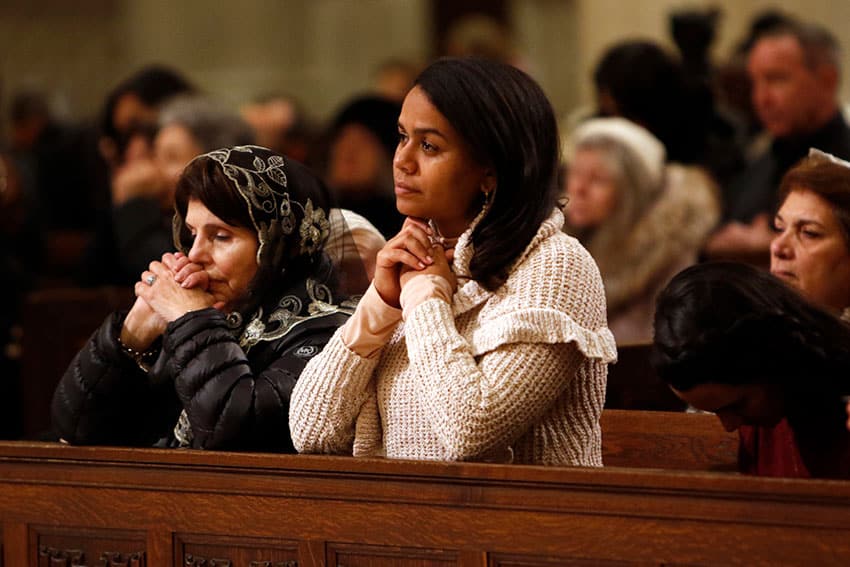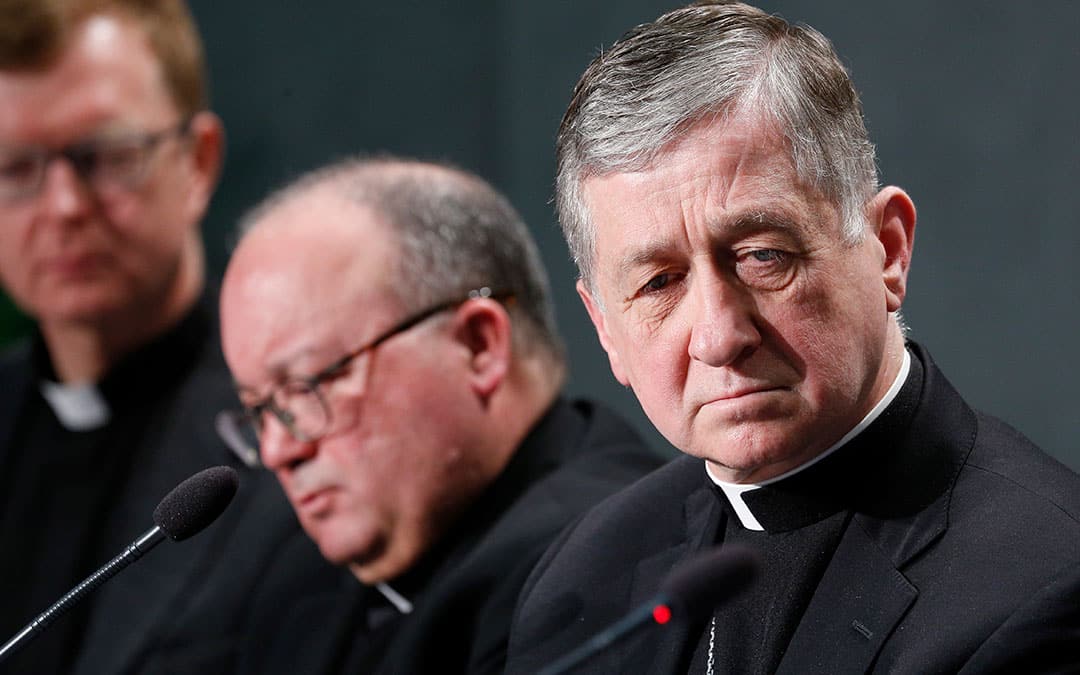Commentary
Giving Voice to Catholic Women
by Mary Rice Hasson

Since the McCarrick scandal broke last year, I have heard from thousands of women all over the globe—women are “devastated,” “heartbroken,” and “outraged,” not only by the horrific abuses and cover-ups that have occurred in their parishes and dioceses, but also by the stunning unwillingness of many in the hierarchy to address the crisis honestly and resolutely. Women’s anguish over the clergy sexual abuse crisis runs raw and deep, and many feel voiceless, with few ways to communicate their concerns and no way to propose reforms.
Women’s voices need to be heard
As Director of the Catholic Women’s Forum, an international network that seeks to amplify the voice of Catholic women in support of Catholic teachings, I sought to share the perspectives of US Catholic women with the Vatican in three ways:
First, through the eyes of Letitia Peyton, the wife of a deacon and mother of a 16-year-old boy molested three years ago by his parish priest in Louisiana (USA). Her letter, linked here, is a moving reminder that the Church’s abuse crisis is not past history, but a present, terrible reality.
Second, through the recommendations of experienced seminary professors (all women), whose document, “Sharing a Spirit of Discernment: Recommendations from U.S Women Seminary Professors,” offers insights on strengthening seminary culture and formation, reducing clericalism, and fostering chaste celibacy. [A summary of this document will be published in LETTERS FROM THE VATICAN later this week. XR II]
Third, through the responses of over 5,000 U.S Catholic women who participated in a survey about the clergy sexual abuse crisis. Our report, “Giving Voice to Catholic Women: A Survey of US Catholic Women on the Clergy Sexual Abuse Crisis,” linked here, offers a window into the hearts of Catholic women strongly committed to the faith and generous to the Church.
Although we make no claim to speak for all Catholic women, these voices are nevertheless thoughtful and compelling, and they deserve to be heard. I strongly encourage all readers, especially clergy and members of the hierarchy, to read the findings of our survey in full, and to listen to the voices of Catholic women. Here, I want to highlight a few of the survey’s findings.
What we know
Faith in God, yes. Trust In the hierarchy, no. Although the vast majority of women surveyed say their faith in God has grown stronger or is unaffected by the crisis, their trust in the hierarchy has been shattered. Only 2% of women say they have a “great deal of trust” in Vatican officials’ handling of the crisis; 87% have “not much” or “no trust” in the Vatican. Bishops fare a bit better with their flocks, but that’s not saying much: just 29% of women express a “great deal” of trust in their bishop’s handling of crisis-related issues. The majority of women (58%) say they have a “great deal” of trust in their parish priest.
The ripple effect of the crisis is clear: although the vast majority (94%) of women surveyed attend Mass weekly or more, 13% now struggle over whether to stay or leave the Church. Their once-rock-solid commitment to the Church has been shaken. More than half of women (53%) say the Church’s handling of the abuse crisis makes it harder to invite family or friends who have left the Church to come back. The mother of a son who has now left the Church put it this way: “The actions of Church leaders have cut me off at the knees in my attempt to bring him back to the Church.” Her son, like thousands of others, is not an official victim in the statistical tallies of the abuse crisis, but he is a casualty nonetheless. Women also report greater reluctance to promote Catholic education (which is struggling already) or to allow their children to serve Mass. Many mothers who encouraged their sons or other young men to consider the priesthood have now fallen silent.
No more double lives
While members of the hierarchy often seem unwilling to state clearly the causes of this crisis, Catholic women aren’t mincing words. An overwhelming number (96%) insist that the hierarchy must address the problem of clergy (including bishops) living double lives involving sexual activity with men. Clergy who live double lives aren’t fooling anyone. Laity are not blind. As one woman wrote, “Those of us paying close attention to the double lives of homosexual priests have nowhere to turn. Where is the hotline to turn my pastor in because he is not faithful to his priestly vows?”
Psychologist Richard Sipe and other researchers made the case to members of the hierarchy years ago that the toleration of sexual activity among supposedly celibate clergy creates a culture of secrecy in which predators find room to roam. Even worse, when members of the hierarchy are themselves compromised, it’s predictable that they will drag their feet, cover-up, or look away from other clergy transgressions, whether misconduct with adults or even crimes against children. A culture of clerical sexual immorality not only enables the abuse of children by creating a culture of secrecy—where many have something to hide—it also deeply damages the laity’s trust, particularly in the hierarchy. So it is not surprising that 96% of Catholic women agree with Pope Francis that clergy who lead double lives and are unwilling to change should leave ministry. “Clergy who cannot teach, follow, and live by the teaching of the Catholic faith should resign or be fired,” wrote one survey respondent.
Rising frustration
Catholic women in the pews are not ambivalent about the need for sexual integrity, and express frustration with the hierarchy’s failure to insist that clergy lead lives of integrity and honesty, in alignment with Catholic teachings. “[T]he priests think they can make different rules for themselves,” observed one woman, “They do not practice what Jesus preaches. They are fakes.” That judgment obviously ought not apply to all priests, but the intensity of it suggests how deep the anger among serious Catholic women is.
Women also recognize the importance of seminary formation, ongoing priestly formation and support: 95% place high importance on rectifying “inadequate” screening of seminary candidates, and nine out of ten identify clergy lack of holiness and weak prayer and sacramental lives as significant factors to be addressed. Abuse of power and lack of transparency generally are viewed as major issues to be addressed.
Codes of Conduct and Transparency. Although the U.S. bishops were not able to pass a code of conduct at their meeting last fall because of a Vatican intervention in the bishops’ conference’s work, women overwhelmingly support such measures: 96% of women favor a code of conduct for bishops that covers sexual abuse and misconduct. This support for a code of conduct, however, should be understood for what it is: a reflection of the level of distrust in the hierarchy. As one woman writes, “The Church, our priests, and our bishops should all be held to a standard far higher than what is ‘legal.’ What is moral? Having sex with seminarians and abusing power is not somehow ‘okay’ just because there aren’t laws against it.” Similarly, women’s strong support for transparency suggests that they fear that, without lay oversight and bishops “bringing everything to the light,” the crisis will not end.
What women expect from the Summit
The Vatican has gone to great lengths to downplay expectations for this meeting, with Pope Francis limiting his goals to “catechesis” on the evil of abuse of minors, raising bishops’ awareness that this is a global problem, and instructing them on how to deal with it. Unfortunately, the Vatican’s truncated view of the problem (limited to minors only), and the accompanying inability to spell out needed reforms, seems likely to confirm for many laity that the Church hierarchy—at least in Rome if not on the home front—simply lacks the will to address the crisis honestly. The U.S. Catholic women we surveyed say it is “essential” for the Vatican meeting to address the problem of clergy living double lives, to seek expansion of the canonical definition of “vulnerable adults” to include seminarians, to emphasize clergy repentance, spiritual conversion, and commitment to holiness and integrity of life. Nine out of ten women also insist that the U.S. bishops must continue to pursue the truth about McCarrick’s career advancement in spite of rumors about his sexual misconduct.
What women want
What do women want? Integrity. Holiness. Leadership. As one woman observed, “Better that our Church actually practice what it preaches and have one priest who is truly faithful than 1000 criminals. Please do the right thing.” Another adds, “Be bold. Be men.” Be the spiritual fathers and faithful shepherds we need.
Mary Rice Hasson, J.D., is a wife, mother of seven, and Director of the Catholic Women’s Forum at the Ethics and Public Policy Centre, where she is also the Kate O’Beirne Fellow in Catholic Studies.






